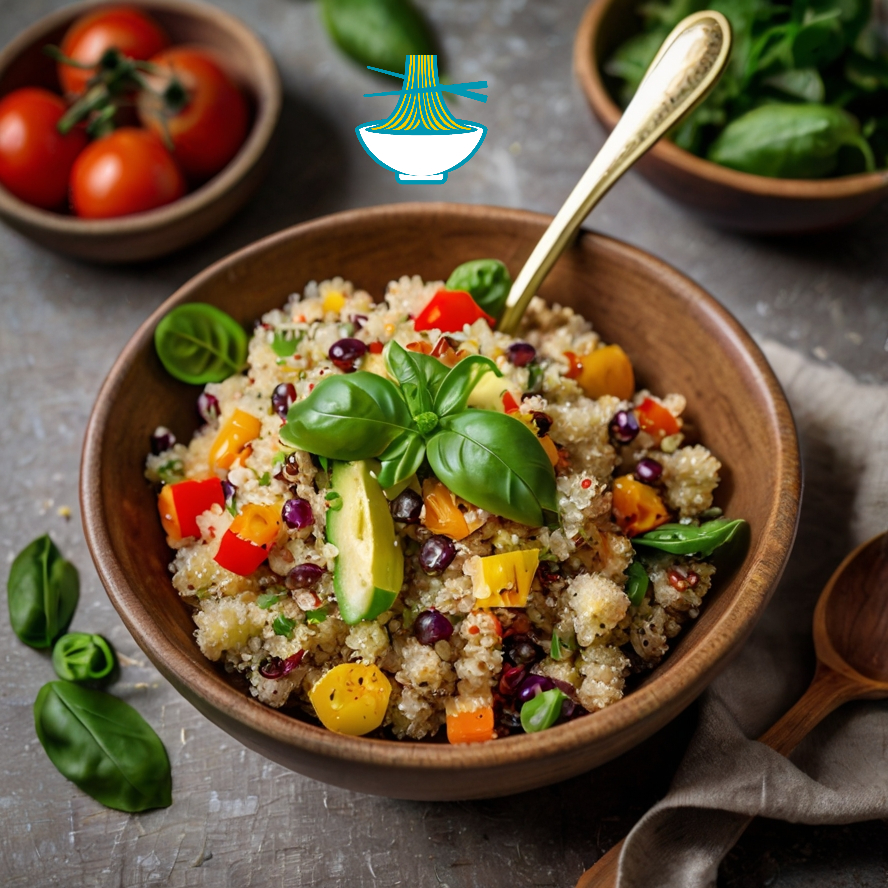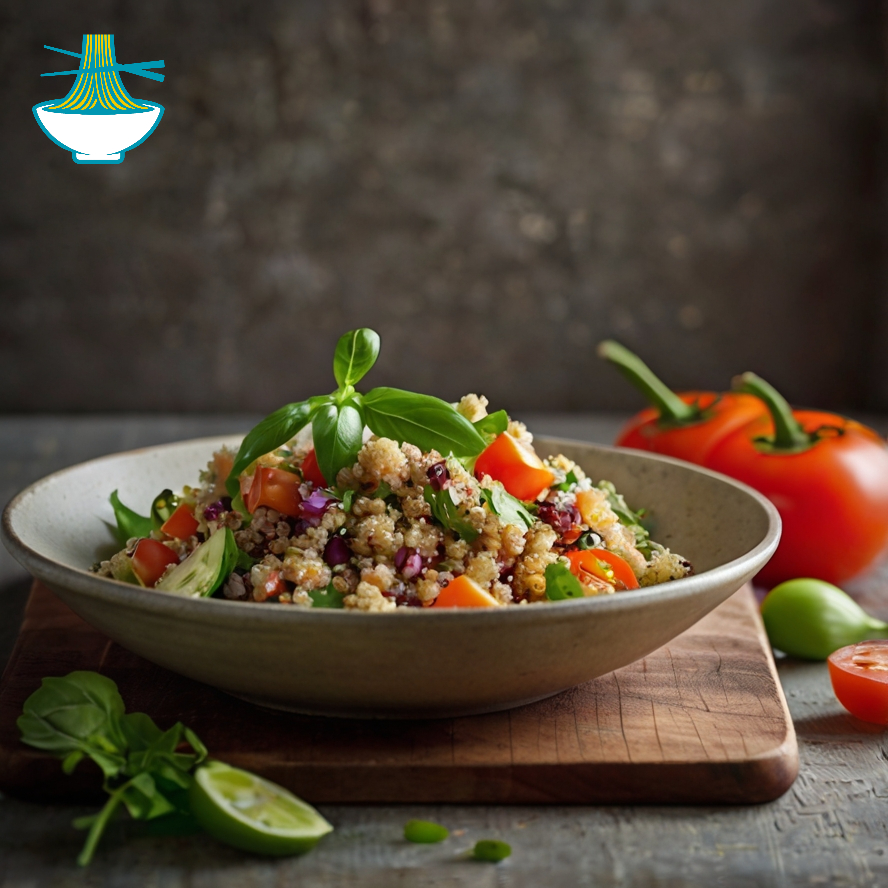Quinoa and Vegetable Salad is a healthy and easy-to-make dish that combines nutrient-rich quinoa with fresh vegetables. This salad is an excellent choice for vegetarians and anyone looking for a light meal packed with protein and fiber. Quinoa is a complete protein, providing all nine essential amino acids, while the fresh vegetables add vitamins, minerals, and antioxidants. This combination supports muscle health, boosts immunity, and promotes digestive health, making it a nourishing and satisfying option.

Quinoa is an ancient seed that was cultivated in the Andean region of South America for thousands of years. It was a staple food for the indigenous peoples of the region due to its high nutritional value. In recent years, quinoa has gained global recognition for its health benefits and is now used in a variety of international dishes.
Ingredients:
- Cooked quinoa
- Diced cucumber
- Cherry tomatoes
- Bell pepper
- Olive oil
- Lemon juice
- Salt and pepper
Instructions:
1. In a large bowl, combine the cooked quinoa, diced cucumber, cherry tomatoes, and bell pepper.
2. Add olive oil and lemon juice to the mixture.
3. Season with salt and pepper to taste.
4. Toss well to combine all ingredients.
5. Serve the salad either cold or warm, according to preference.

Nutrition Value:
1. Cooked quinoa
- Calories: 120 per 1/2 cup
- Carbohydrates: 21 g
- Protein: 4 g
- Fat: 2 g
- Sodium: 7 mg
- Cholesterol: 0 mg
- Vitamins: B-vitamins (especially B6 and folate)
- Minerals: Magnesium, phosphorus, manganese, iron
- Nutritional benefit: Provides complete protein with all essential amino acids, high in fiber, and rich in important minerals.
2. Diced cucumber
- Calories: 16 per 1/2 cup
- Carbohydrates: 4 g
- Protein: 1 g
- Fat: 0 g
- Sodium: 2 mg
- Cholesterol: 0 mg
- Vitamins: Vitamin K, Vitamin C
- Minerals: Potassium, magnesium
- Nutritional benefit: Hydrating with a high water content, low in calories, and provides vitamins that support bone health.
3. Cherry tomatoes
- Calories: 27 per 1/2 cup
- Carbohydrates: 6 g
- Protein: 1 g
- Fat: 0 g
- Sodium: 6 mg
- Cholesterol: 0 mg
- Vitamins: Vitamin C, Vitamin A
- Minerals: Potassium
- Nutritional benefit: Rich in antioxidants like lycopene and vitamins that boost immune health and skin health.
4. Bell pepper
- Calories: 24 per 1/2 cup
- Carbohydrates: 6 g
- Protein: 1 g
- Fat: 0 g
- Sodium: 2 mg
- Cholesterol: 0 mg
- Vitamins: Vitamin C, Vitamin A, Vitamin B6
- Minerals: Potassium
- Nutritional benefit: High in antioxidants and vitamins that support immune function and vision health.
5. Olive oil
- Calories: 119 per 1 tablespoon
- Carbohydrates: 0 g
- Protein: 0 g
- Fat: 14 g
- Sodium: 0 mg
- Cholesterol: 0 mg
- Vitamins: Vitamin E
- Minerals: None significant
- Nutritional benefit: Provides healthy monounsaturated fats that support heart health and reduce inflammation.
6. Lemon juice
- Calories: 4 per tablespoon
- Carbohydrates: 1 g
- Protein: 0 g
- Fat: 0 g
- Sodium: 1 mg
- Cholesterol: 0 mg
- Vitamins: Vitamin C
- Minerals: Potassium
- Nutritional benefit: High in vitamin C, supports immune health, and aids in digestion.
7. Salt
- Calories: 0 per 1/4 teaspoon
- Carbohydrates: 0 g
- Protein: 0 g
- Fat: 0 g
- Sodium: 590 mg
- Cholesterol: 0 mg
- Vitamins: None
- Minerals: None significant
- Nutritional benefit: Enhances flavor but should be used in moderation to avoid excess sodium intake.
8. Pepper
- Calories: 6 per 1/4 teaspoon
- Carbohydrates: 1 g
- Protein: 0 g
- Fat: 0 g
- Sodium: 0 mg
- Cholesterol: 0 mg
- Vitamins: Vitamin K, Vitamin C
- Minerals: Iron, potassium
- Nutritional benefit: Adds flavor without calories, provides antioxidants, and supports digestion.


Comments